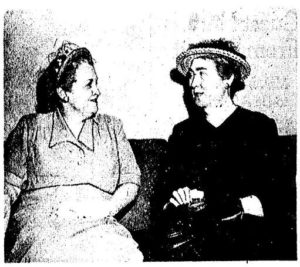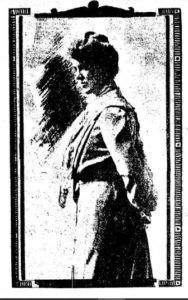By Rita Shelley
Alice Grace Harvey
A native of Tobias, Nebraska, a village of 300 in the southeastern part of the state, she was “Miss Harvey” to generations of students at Omaha’s South High School where she taught typing and shorthand for 35 years. To everyone else, she was Alice Grace Harvey, poet, author, and lyricist.
Alice died in 1976 at the age of 84 from complications of diabetes,[1] leaving a legacy of widely published poetry, short stories, and a play. She penned the lyrics for “My Omaha,” described as a rousing, rhythmic, toe-tapping march that was performed by the South High School Packers band in 1954.[2] Unfortunately, the lyrics and music are no longer extant.
Alice’s legacy extended well beyond that of teacher and writer. She also advocated for poetry as an art form, hosting a writing group at the home she shared with her mother. She celebrated local poets whose work was otherwise unknown, including Mrs. Frank Rankin’s verses honoring disabled veterans, elders, and laborers. She also noted Mrs. Leon Smith’s “Birch Interlude” inspired by trees in Omaha’s Miller Park.[3] In 1936, Alice was elected director of the Nebraska State Historical Society’s writers’ guild.[4] She mentored a group of writers from the Omaha chapter of the American Association of University Women (AAUW).[5] She published a book about Nebraska authors. She presented her “original dramatic sketch” about Christmas candles at the AAUW’s annual meeting in 1944.[6] She led a statewide poetry school.[7] After retiring in 1957, Alice continued her writing sideline with articles and stories in teachers’ and children’s magazines.[8]
In her 1961 book of poetry, “The Hum of the Land,” Alice mourned the war from which men of her generation did not return:
Our World Memorial Day
Today American flags will wave around the world,
As graves of our soldier dead are marked
By thousands of kindly hands of foreign friends.
Who bow their heads and place a tiny flag
Beside white crosses in stately, solemn rows.[9]
And ahead of her time, the writer and teacher from Tobias also held hope for a future without racism:
He Saw No Color
For all the years that man has lived on earth
Tribe fought with tribe and sought to be supreme.
Then came The One who looked within the soul
And found the heart which had no color line,
To Him each one bore an eternal mark,
So let us strive to reach the shining goal
By simply looking deep for something fine,
That hate will fade for those skins dark.[10]
Alice Harvey (right) sits with her Phi Delta Gamma sister Mrs. William Kavan. Omaha World-Herald. 25 June 1952, p. 19.
Avery Abbott
The author of a 1910 article, “Women Who Do Things,” recognized Omaha author Mabel Rundell Abbott for her literary accomplishments, described her writing process, and assured readers that Mrs. Abbott was both brilliant and logical. The writer marveled at her mental qualities, expertise at making a good cup of coffee, and the joy she took in domestic pursuits, saying she was “never happier than when enveloped in a becoming apron.”[11]
Publishing under the pen name Avery Abbott, the wife of Omaha World-Herald drama critic Keene Abbott was described as a prolific author as often as she was as celebrated as an exemplar of true womanhood.
At the time of the 1910 article about her literary and homemaking accomplishments, she had been commissioned by McClure’s magazine to write a 5,000-word article about a humorist from Hannibal, Missouri, none other than Mark Twain.[12]
“I could not compose a line without a pencil in my hand,” Avery told her interviewer. “The rattle of typewriter keys disconcerts me so greatly, but with plenty of pencils and paper on the table and a well-sharpened pencil in my hand, I am ready for work.” An article she published in Cosmopolitan magazine was written on a scrap of paper in her lap while she was traveling on a train.[13] In 1912, Avery published “Captain Martha Mary,” a tale of a young girl, the eldest of five children, trying to hold her family together in spite of grinding poverty.
While a student at the University of Iowa, Mabel Rundell met her future husband, a literature professor. They married in 1905, beginning a partnership that lasted until his death in 1941.[14] In spite of the long-term success of their relationship, Avery learned that the results of collaboration could be uneven. Co-authoring, she said, was a mistake when it resulted in a “faulty and uneven style that does neither credit. Keene went over [the text] with the pruning shears and ruthlessly chopped out all my part. Imagine my chagrin when he sold it to the first publisher who saw it.”[15] With a better outcome, they co-authored an illustrated historical sketch with stereopticon slides, titled “Nebraska, Mother of States,” for the National Society of Colonial Dames.[16]
Referencing a profile of Avery in Woman’s World Magazine, one reporter observed that “…whether Avery Abbott is listening to the birdies and drawing inspiration for another Woman’s World yarn, or whether she is actually laying the final brick in this enchanting garden nook…or making home an attractive place for her husband…you’d like her as a woman and – this is a secret – you’d like her as a cook, for she can bake a pan of fluffy, fragrant, light-hearted biscuits.”[17]
For locally published poetry, Avery looked to Nebraska nature for inspiration, including sadness about the arrival of winter (“icy rain/smiting the windows/slashing through gutters”).[18] She also wrote of a gift received from neighborhood children:
The Gift
They brought me lilies, fair and sweet and tall,
They gave me beauty but that was not all.
Breathing soft fragrance in my lonely room,
The lilies know how blest it is to bloom,
Reaching to light that gives old pain surcease,
They, bringing lilies, also brought me peace.[19]
After a widowhood of two decades, Avery died at an Omaha nursing home in 1961 at age 91.[20]
Mrs. Avery Abbott, as pictured in the Omaha World-Herald, 5 June 1910.
[1] “Alice Harvey Dies, Teacher.” Omaha World-Herald. 14 May 1976, p. 40.
[2] “Music Week Spotlights City High Schools.” Omaha World-Herald. 25 May 1954, p. 25.
[3] “Writers Hold Literary Tea.” Omaha World-Herald. 12 March 1936, p. 61.
[4] “State Writers Elect Officers.” Omaha World-Herald. 8 November 1936, p.63.
[5] “AAUW to Hold Annual Tea Event.” Omaha World-Herald. 7 December 1944, p. 12.
[6] “Creative Writers to Have Luncheon.” Omaha World-Herald. 5 January 1940 p. 73.
[7] “Poetry School to Open Grand Island Meeting.” Omaha World-Herald. 26 April 1946, p. 5.
[8] “Story-Writer.” Omaha World-Herald. 23 February 1958, p. 55.
[9] Harvey, Alice G. Hum of the Land. South High School Print Shop, 1961. p. 35.
[10] Ibid. p. 20.
[11] “Women Who Do Things.” Omaha World-Herald. 5 June 1910, p. 42.
[12] Ibid.
[13] Ibid.
[14] “Death Takes Mrs. Abbott.” Omaha World-Herald. 17 Nov 1961, p. 39.
[15] “Women Who Do Things.” Omaha World-Herald. 5 June 1910 p. 42.
[16] “Write Story of Nebraska.” Omaha World-Herald. 20 January 1931, p. 12.
[17] “National Magazine Carries Article About Avery Abbott, Local Author.” Omaha World-Herald. 28 April 1927, p. 14.
[18] “Winter Wheat.” Blaine, Frederick. Poems by Nebraska Poets. Marshall Press, Lincoln, NE. 1940. p. 36.
[19] Ibid, p. 95.
[20] “Death Takes Mrs. Abbott.” Omaha World-Herald. 17 Nov 1961, p. 39.

